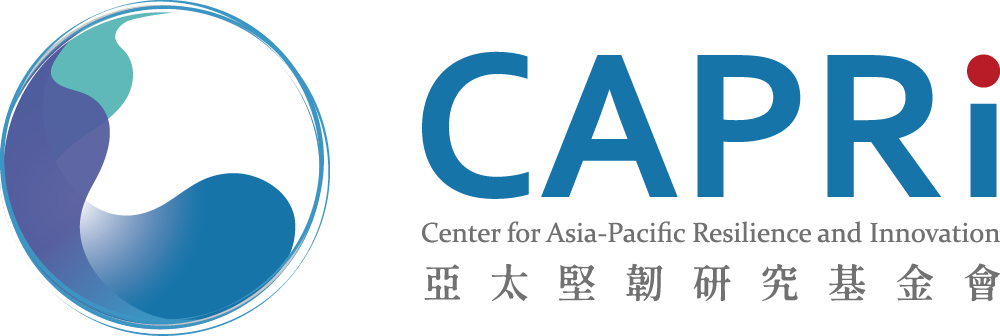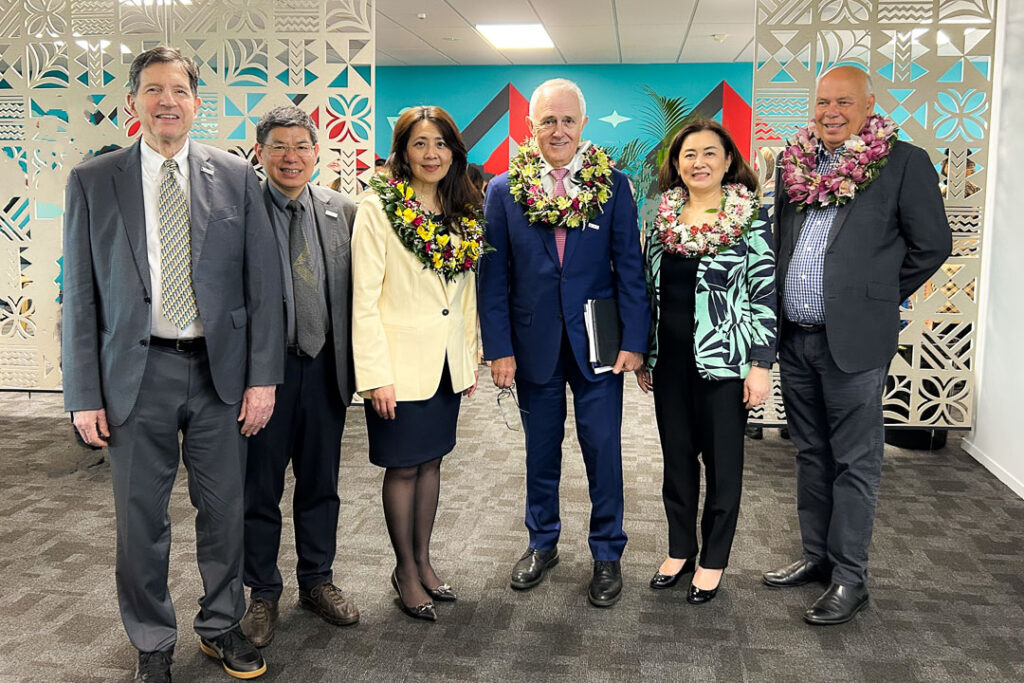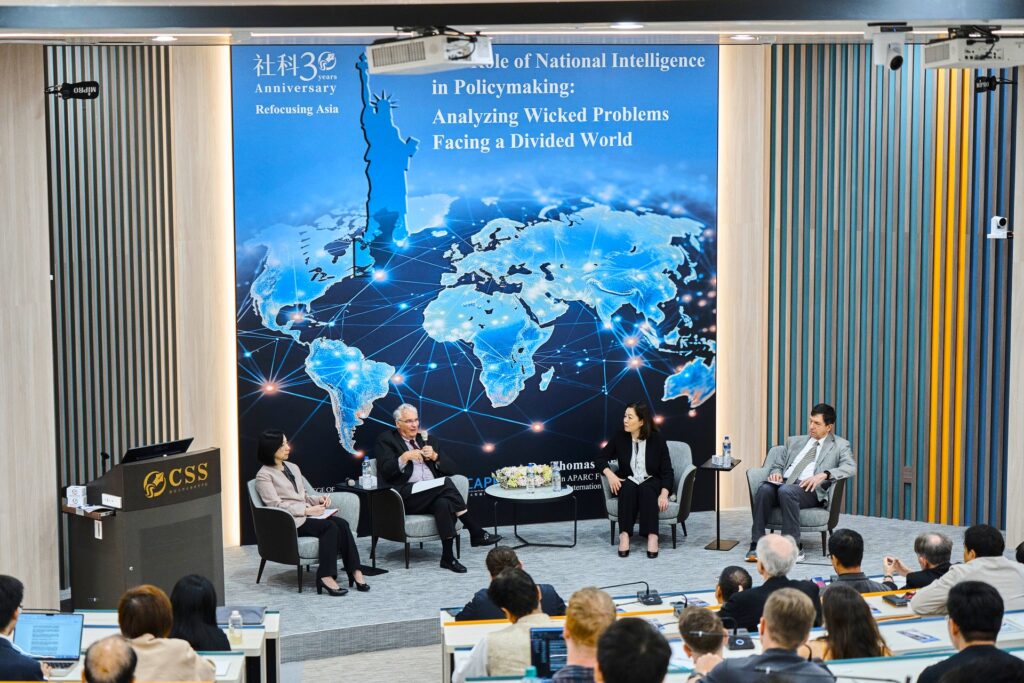TAIPEI, TAIWAN May 29, 2023—The Center for Asia-Pacific Resilience and Innovation (CAPRI) hosted its first Annual Forum on Monday, bringing former Australian prime minister Malcolm Turnbull, World Health Organization (WHO) advisors, and academic and corporate leaders from around the world to discuss how to address the world’s most pressing challenges to resilience.
“The COVID-19 pandemic showed us that problem-solving must happen across borders and sectors,” said Turnbull in his opening keynote of the forum. “As authoritarian, populist, and protectionist regimes gain traction worldwide, democratic leaders in Asia and the Pacific should work together to build a collaborative ecosystem for solving the world’s toughest challenges.” Turnbull chairs CAPRI’s International Advisory Council, and his appearance on Monday marks his first-ever visit to Taiwan.
CAPRI is a nongovernmental, nonpartisan, international organization founded in Taipei to enhance global resilience and promote innovative governance by drawing on the experience of the Asia-Pacific region through comparative public policy research. Monday’s forum, titled Asia Pacific: A Resilient Phoenix Rising from the Pandemic, marked the first anniversary of CAPRI’s founding as one of the only international nongovernmental organizations to be established in Taiwan.
“The past year has highlighted Asia-Pacific leadership,” said Syaru Shirley Lin, founder and chair of CAPRI. “From its participation in the G20 and G7 meetings to its success in economic growth and pandemic recovery, the region is showing the world how we can emerge from crises stronger and more resilient. As policymakers move beyond the COVID-19 pandemic, our Annual Forum is showcasing both the achievements and work still needed to build more resilient societies.”
The forum culminated in a speech by Taiwan Premier Chen Chien-Jen on the concept of national resilience. “All countries should make good use of the opportunities provided by the pandemic […] This includes promoting necessary structural reforms such as digital transformation and green transition, to facilitate a strong post-pandemic recovery.” An epidemiologist and former health minister during the SARS epidemic, Premier Chen is on the board of the global Reform for Resilience Commission, of which CAPRI is a founding regional hub.
Throughout the forum, experts and leaders in policy research, global health, technology, and education spoke on topics of resilience in the Asia Pacific. Chairman Sunjoy Joshi of India’s Observer Research Foundation, economist Alicia Garcia Herrero, and Professor Harry Harding spoke from their experiences leading policy research organizations in Asia, Europe, and the United States about the role of think tanks in today’s uncertain world. Dean Kristoffer Berse of the National College of Public Administration and Governance, University of the Philippines Diliman, moderated the panel.
Two WHO advisors who are part of CAPRI’s International Advisory Council, David Heymann and Eng-Kiong Yeoh, spoke on the importance of investing in public health and environmental health in protecting individuals and economies.
Lim Boon Heng of Temasek, Stan Shih of Acer, Lynette Ng of TSMC, and Ambassador Stephen Mull of the University of Virginia had a unique discussion on how the global supply chain of talent drives innovation and resilience in both the private sector and education.
Also joining the panels were Prof. Yik Ying Teo, Dean of the Saw Swee Hock School of Public Health at National University of Singapore; Prof. Mimi Riley from the University of Virginia; and CAPRI senior fellows Dr. Swee Kheng Khor (Angsana Health, Malaysia), Prof. Feng-Jen Jean Tsai (Taipei Medical University), Prof. Minah Kang (Ehwa Womans University, South Korea), and Sir Collin Tukuitonga (University of Auckland). These fellows are contributing to Asia-Pacific research with the global Partnership for Health System Sustainability and Resilience (PHSSR), a World Economic Forum (WEF) initiative that provides a platform for cross-sector research and collaboration to make health systems worldwide more sustainable and resilient. The fellows highlighted challenges and successes from their respective countries in building health resilience while combatting climate change and ensuring economic growth.
Other members of CAPRI’s International Advisory Council in attendance at the forum included Maria Livanos Cattaui, former Director-General of the International Chamber of Commerce and managing director of WEF and Dr. Aij-Lie Kwan, President of the International College of Surgeons.
At the forum’s closing, Turnbull and Chen underscored the need for collaboration in the Asia-Pacific region across sectors and disciplines to build resilience worldwide.
About the Center for Asia-Pacific Resilience and Innovation (CAPRI)
CAPRI is a nongovernmental, nonpartisan, international organization founded in 2022 to enhance global resilience and promote innovative governance by drawing on the experience of the Asia-Pacific region through comparative public policy research. CAPRI’s values of independence, integrity, and inclusivity guide its work on meeting challenges to resilience at the intersection of health, innovation, environmental sustainability, and the economy in the Asia Pacific.
CAPRI is governed by a board of experts in fields related to CAPRI’s mission and from organizations that are committed to evidence-based public policy analysis. An International Advisory Council of global leaders who provide input on CAPRI’s research and projects. CAPRI is supported by leading private-sector donors, including Cheng-Han Education Charity Trust Fund, which is affiliated with leading financial institution Fubon Group; Acer Foundation; and MediaTek, a leading fabless semiconductor company. Since its founding, CAPRI has also received contributions from TSMC and UMC, two leading semiconductor companies, as well as Tung-Ho Steel, Chen-Yung Foundation, Jeffrey D. Schwartz and Na Tang Jewish Taiwan Cultural Association, and Wego Foundation. Based in Taipei, CAPRI collaborates with leading international policy institutions and global initiatives to advance its research and engagement.
For more information, visit www.caprifoundation.org




